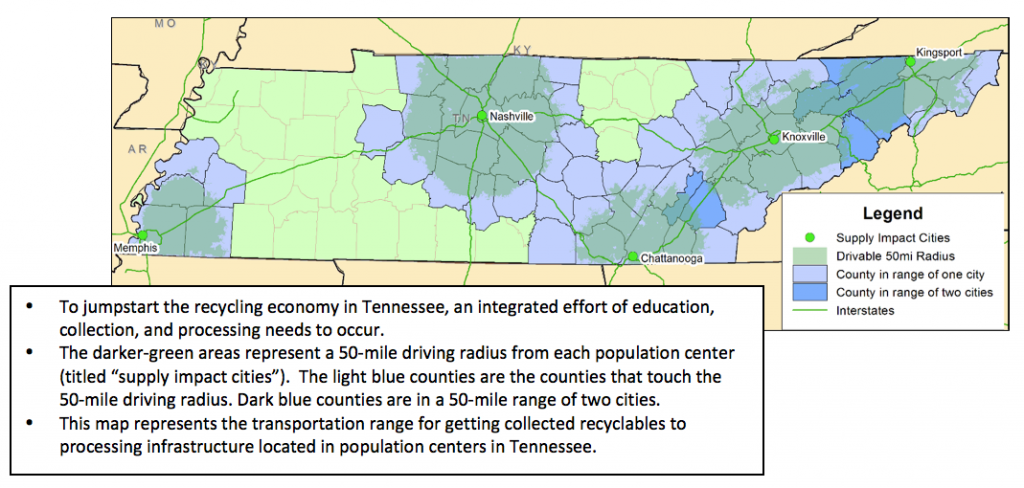State of Tennessee Recycling Economy Characterization
The Southeast Recycling Development Council (SERDC) partnered with RRS to provide a characterization study for the State of TN. This work was sponsored through a contract between SERDC and the Tennessee Department of Environment and Conservation (TDEC).
TDEC wanted a report that provided relevant data and a snapshot of the “recycling economy” in TN – from disposal to end markets. TDEC wanted a better understanding of the recyclable material being disposed in the residential waste stream in counties across Tennessee. They wanted to get a sense of the demand for recycled feedstock within the State, and project this demand against the current material that is recovered. There was a big desire to show the economic impact of recovering more recyclable material, the commodity value-add that occurs through the recycling process, and the resulting economic development impact.
This document gave TDEC a fact-based tool they could share with legislators, business and industry, federal, state and local agencies across TN and the Southeast to assist with developing policy, and economic development and solid waste management planning. The report also provided TDEC a roadmap to continue development of the recycling infrastructure in the state.

RRS painted a picture for the State of Tennessee that touched on many aspects of the recycling puzzle:
- Mapped the quantity of residential recyclables disposed by each county in TN
- Developed community profiles that highlighted the type of collection system, materials collected, households served, lbs/HH collected, distance to closest processing facility, and offered brief suggestions for program optimization.
- Provided overview of processing facilities
- Developed map displaying potential recyclable material end markets in TN and SE USA
- Developed profiles of 3 commodity-specific end markets in TN that highlighted facility location, commodity grades sourced, tonnage sourced annually, tonnage of material available through municipal programs in TN, pricing range for commodity purchased, identification of product manufactured, and value of end product manufactured
- Proposed hub and spoke network showing regional supply impact
- Summarized opportunities in TN for increasing access to recyclable collection, and long term benefits for investing in the recycling infrastructure that could contribute to job growth and economic development.
TDEC has used the results of this characterization report and associated slide deck to show economic benefit and move this idea forward with local governments. Some points they have pushed include:
- Return on investment of infrastructure
- Looking at lbs/HH diversion from highlighted community profiles – providing examples to local governments on diversion potential
- Economic potential of increased recyclable material generation and investment opportunity
- End users profiles and MRF map – proximity to markets, end-user demand
- Economics and financial message – pushing this with local governments, and policy/legislative bodies
- Using this slide deck whenever they have an ear – presenting from SC to MI
- TDEC believes this has encouraged and influenced others to pick-up this message
- TDEC has adapted the principles laid out in the report and is using it as a reference on everything related to recycling infrastructure development from a State Approach
The project has produced a ripple effect of activity around this topic. Shortly after the report was released, RRS in partnership with SERDC produced articles associated with this project that were published in Resource Recycling magazine, and Recycling Today. In short order this project was presented and discussed by TDEC, SERDC and RRS at recycling and solid waste industry conferences across the Southeast. The characterization report was used to develop content for a follow-up symposium sponsored by TDEC and produced by SERDC. The 2013 Tennessee Symposium: Growing Tennessee’s Recycling Economy was held in Nashville, TN, in August 2013.
In addition, TDEC is following through on the production of a state supported hub and spoke development plan. RRS, SERDC, and TDEC continue to be active in a regional push in the Southeast United States and beyond toward infrastructure development and improved recycling program optimization efforts.
